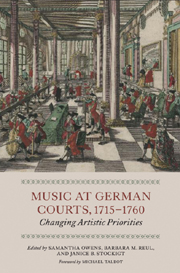Book contents
- Frontmatter
- Contents
- List of Tables
- Foreword
- Preface
- Editorial Notes
- Notes on Contributors
- List of Abbreviations
- 1 ‘Das gantze Corpus derer musicirenden Personen’: An Introduction to German Hofkapellen
- KINGDOMS AND ELECTORATES
- 2 The Court of Saxony-Dresden
- 3 The Saxon Court of the Kingdom of Poland
- 4 The Court of Brandenburg-Prussia
- 5 The Palatine Court in Mannheim
- DUCHIES
- PRINCIPALITIES AND PRINCE-BISHOPRICS
- LANDGRAVIATES AND MARGRAVIATES
- Index
4 - The Court of Brandenburg-Prussia
from KINGDOMS AND ELECTORATES
Published online by Cambridge University Press: 12 September 2012
- Frontmatter
- Contents
- List of Tables
- Foreword
- Preface
- Editorial Notes
- Notes on Contributors
- List of Abbreviations
- 1 ‘Das gantze Corpus derer musicirenden Personen’: An Introduction to German Hofkapellen
- KINGDOMS AND ELECTORATES
- 2 The Court of Saxony-Dresden
- 3 The Saxon Court of the Kingdom of Poland
- 4 The Court of Brandenburg-Prussia
- 5 The Palatine Court in Mannheim
- DUCHIES
- PRINCIPALITIES AND PRINCE-BISHOPRICS
- LANDGRAVIATES AND MARGRAVIATES
- Index
Summary
THE PRUSSIAN HOHENZOLLERN KINGS were descendants of the ‘Great Elector’ Friedrich Wilhelm I of Brandenburg (r. 1640–88) and his first wife, Luise Henriette of Orange (1627–1667). Under Elector Friedrich III – crowned as Prussian King Friedrich I in 1701 – and his second wife, Sophie Charlotte (d. 1705), music rose to a central place in Hohenzollern court life.
Under Friedrich Wilhelm I (r. 1713–40), music was all but exiled to the military. Yet chamber music continued to be fostered by Queen Sophie Dorothea (1687–1757), daughter of King George I of England, who supported her children's musical education. Crown Prince Friedrich (1712–1786) and Princesses Wilhelmine (1709–1758), Luise Ulrike (1720–1782), and Anna Amalie (1723–1787) became accomplished musicians and significant patrons of the arts. During the 1730s Friedrich and his sister Wilhelmine (Margravine of Brandenburg-Bayreuth from 1735) would establish significant Hofkapellen of their own.
Under Friedrich II (king from 1740), Prussia became a major European power with a corresponding cultural agenda. The court orchestra flourished until the outbreak of the Seven Years' War in 1756, and the capital became a centre for public and private music making. Friedrich's younger brothers, Princes August Wilhelm, Ferdinand, and Heinrich, also established Hofkapellen, and his youngest sister Princess Amalie played several instruments, composed, and developed a keen interest in contrapuntal music, collecting scores that served as a foundation for the cultivation of music by Handel and members of the Bach family.
- Type
- Chapter
- Information
- Music at German Courts, 1715–1760Changing Artistic Priorities, pp. 79 - 130Publisher: Boydell & BrewerPrint publication year: 2011

